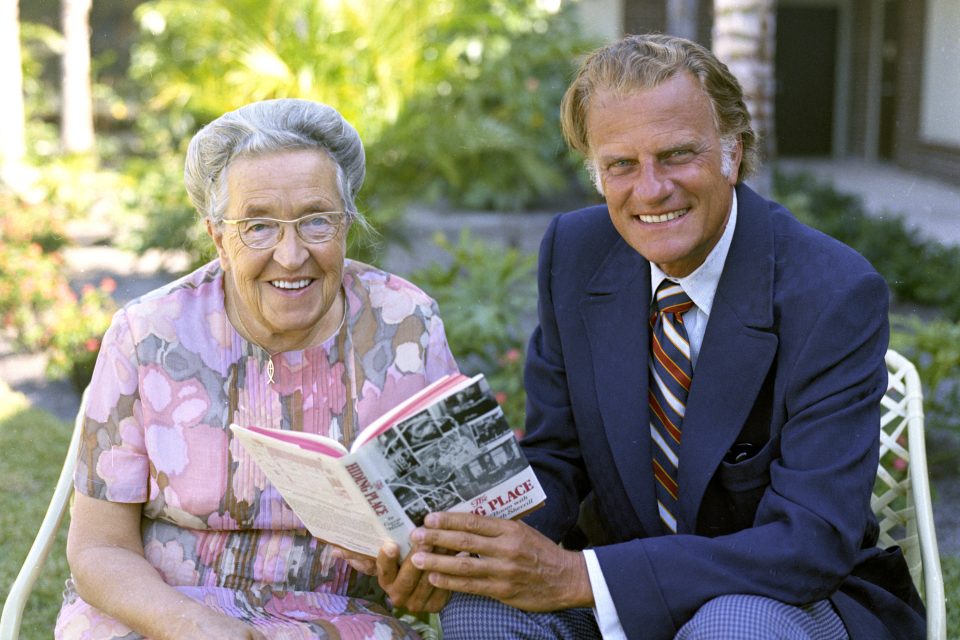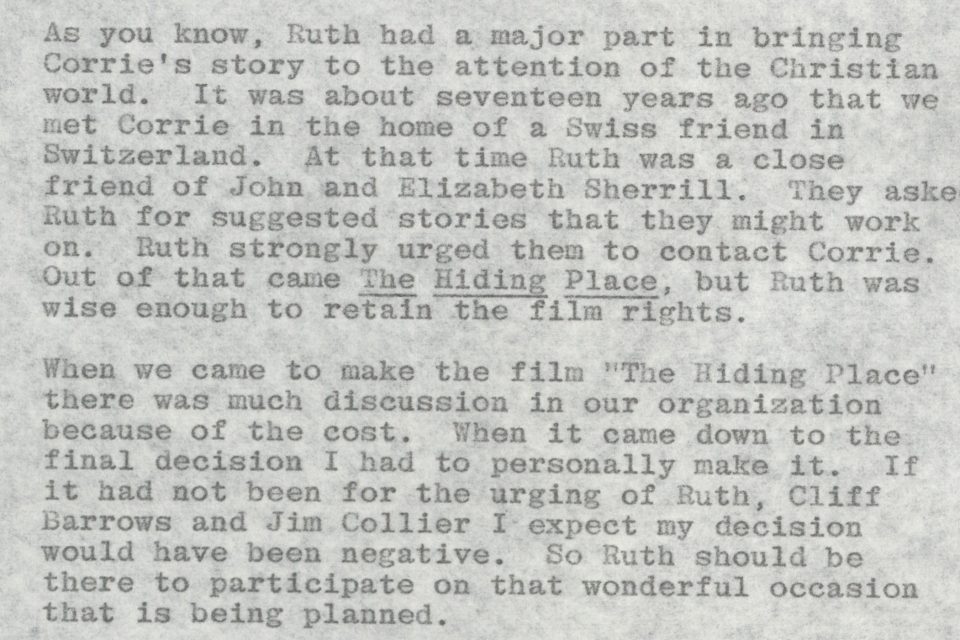From the Archives: Corrie ten Boom’s Friendship with Billy and Ruth Graham
January 7, 2025
Categories: The Archive Collection
Categories: The Archive Collection

Corrie ten Boom and her family are known for bravely protecting and housing people being hunted by Nazis during the Second World War. After being arrested, Corrie and her sister, Betsie, were forced into a concentration camp, where they spread the Gospel with many in the camp. Betsie, unfortunately, died in the camp, but Corrie was accidentally discharged from Ravensbruck due to a clerical error shortly before all the other women her age were sent to the gas chambers. After surviving the concentration camp, Corrie used her testimony to share the love of God with the world, becoming an author and Holocaust activist. She shared what her sister Betsie did days before her death: “There is no pit so deep that He [God] is not deeper still.”
Billy Graham kept a close friendship with Corrie ten Boom after some mutual friends first introduced them in Switzerland in 1960. Billy Graham’s film production company, World Wide Pictures, would later film and produce The Hiding Place in 1975 – depicting the true story of Corrie’s experience during the Holocaust. In a letter written to William Harbour, Jr. in 1973, Billy Graham details his and Ruth Graham’s first meeting Corrie, and Ruth’s special involvement in putting The Hiding Place production into action:

As you know, Ruth had a major part in bringing Corrie’s story to the attention of the Christian world. It was about seventeen years ago that we met Corrie in the home of a Swiss friend in Switzerland. At that time Ruth was a close friend of John and Elizabeth Sherrill. They asked Ruth for suggested stories that they might work on. Ruth strongly urged them to contact Corrie. Out of that came The Hiding Place, but Ruth was wise enough to retain the film rights.
The film, The Hiding Place, was released in 1975 at the Beverly Theater in Los Angeles. Before the premiere, someone threw a tear gas canister into the theater, forcing everyone to evacuate. Billy Graham remembers Corrie Ten Boom’s response in his autobiography, Just As I Am:
At a reception later that evening, Corrie ten Boom spoke in her distinctive Dutch accent: “People asked me tonight, ‘What did you feel about this [tear-gas] bomb that was falling?’ I was touched. I was sad. Do you know why? Not only because there was in some way disappointment for people who had hoped to see the film but because on that bomb was the Hakenkreuz, the [Nazi] swastika… What we have to do is love these people how hate us—love them, pray for them. These people are wounded people who have hate in their hearts. They need forgiveness. They need the Lord… That is the answer we must give.”
While the two maintained busy lives with their respective ministries, they kept in touch often by sending letters and gifts of encouragement. Billy Graham regarded her as “one of the greatest Christian heroines of the century.” For Christmas 1970, Billy Graham gifted a Bible to Corrie with the inscription:
Corrie sent a card to Billy and Ruth Graham, mentioning how she enjoyed having a “clearly printed Bible,” and thanking him for a “good gift.” She also encouraged him, saying, “Praying for you… Be of good courage, Jesus is Victor!”
Corrie was often an invited speaker at Billy Graham’s Crusades. When she shared the Gospel and God’s perfect plan, she used the illustration of a piece of embroidery with its knots and jumble of threads on the reverse, but the beautiful image on the front. She said, “Although the threads of my life have often seemed knotted, I know, by faith, that on the other side of the embroidery… There is a Crown.”
Corrie ten Boom passed away on April 15, 1983, receiving her crown in Heaven.
The Billy Graham Archive & Research Center houses Billy Graham’s correspondence, sermon notes, and memorabilia from his more than 70 years of ministry. To schedule a research appointment, visit BillyGrahamArchiveCenter.org.